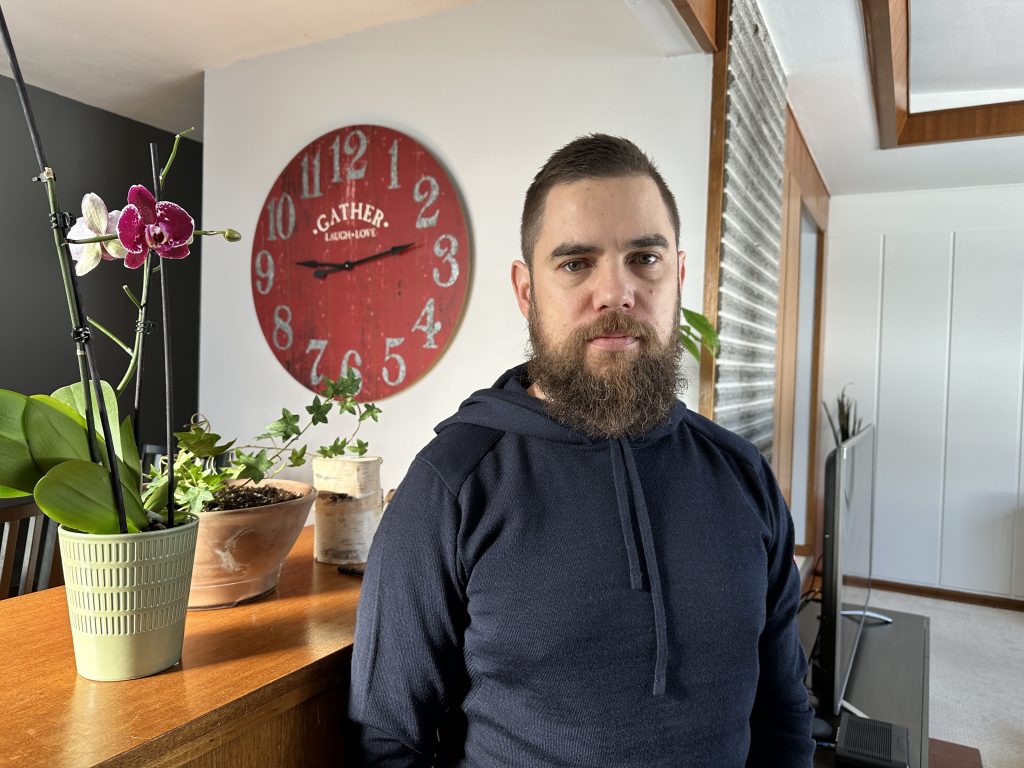Winnipeg respite worker feels industry’s employment standards hurting youths in crisis

Posted March 13, 2024 10:46 am.
Last Updated March 13, 2024 7:59 pm.
Mike Rosenby feels marginalized, underpaid and easily replaceable.
The Winnipeg respite worker with more than 20 years of experience supporting youth and families in crisis is decrying the industry’s poor employment standards.
He feels it’s directly leading to staff shortages and a high turnover rate, further exacerbating the situation for those determined to keep working with youth in care.
“It’s hard to be really happy with a job when you feel that you have no value,” Rosenby said.
Rosenby recalls the situation taking a turn in 2020 when his former long-time employer, The Link, let all its respite worker staff know they would no longer be classified as employees, but rather as contract workers.
“We had, I think it was, three months’ notice or so that we were being converted into contract employees. If you didn’t sign, you didn’t have a job,” he recounted.
“There was no levels of pay. Didn’t matter your experience. Didn’t matter anything. So it just went to a flat $15.”
Rosenby feels making less than minimum wage, which is currently at $15.30 in Manitoba, is not fair for someone responsible for youth in care.
“You lost vacation pay, benefits, pension,” he said. “And different time constraints that they pay less… but you’re still doing the exact same job. You’re reporting to the same people.
“It became infinitely harder with less benefits and it became a place that I didn’t want to work for.”

The Link’s chief executive officer called respite workers “important, integral” parts of their team. But she specified they are not employees of The Link, but rather employees of the foster families.
“When we speak about the respite workers, it really is a negotiation between the foster parent and the respite worker,” said Kerri Irvin-Ross.
“The foster parents are responsible for signing the contract. The foster parents are responsible for doing the scheduling, and also foster parents can also set their own rates if they choose to.”
Irvin-Ross says the transition from employee to contract work was in line with what other agencies, like New Directions, had done. CityNews confirmed with New Directions it does not have respite workers on staff, and they are under contract employment with foster families.
“I think it’s important to point out though that nothing changed as far as, we still submitted paperwork directly to The Link,” Rosenby said. “We submitted our hours directly to The Link. All of our… cheques, everything through The Link. They said that we work for the foster parents, but nothing changed.”
Companies cutting costs?
Julia Smith, an assistant professor in the labour studies program at the University of Manitoba, says she’s seeing more employers turning to contract-based hiring, which relieves them from most employment standards like minimum wages and benefits.
“For companies it’s a way to cut costs, right?” Smith said. “If they’re employing people as contract workers, they’re not committed to having them long term and all the costs that come with that.”
Smith says there are jobs which being contract workers makes sense, such as freelance writing. But Smith says more and more companies are toeing the line, making it seem like employees can set their own terms — which is the one of the key characteristics of contract work — but still overall have control over the worker. She adds this is what she sees with rideshare drivers.
“Yes, those employees can pick and choose when they want to work and it’s their car they’re providing their service in, but Uber controls the app that they use. Uber controls the price that is going to be charged for the ride,” she said.
Irvin-Ross says The Link acts to help with administrative costs for the foster families, such as helping respite workers facilitate necessary record checks and sending proper invoices.
Flat rate for overnight, weekends
The switch to contract work four years ago also came with a cut in pay for overnight visits.
Rosenby says respite workers used to get paid up to 16 hours plus a flat rate for overnight. Now, Irvin-Ross says there’s simply one “flat rate” that can range from $300 to $500 depending on how long the weekend is.
“The decision about the flat rate was based on the funding that we received and how we can best support the young person,” Irvin-Ross said. “It’s acknowledging that there is involvement with them. In some cases, when the respite worker is doing an overnight, it’s like going to aunty’s or uncle’s house. We acknowledge that there are costs attached to that and that’s why we provide the flat rate.
“That was negotiated as part of the cost sheet.”

It’s created a discussion about whether a worker who is “sleeping” is still considered to be working.
“That’s not the definition that we’ve applied,” Irvin-Ross said. “They still would be considered responsible, but it was a flat rate that we decided with our cost sheet.
“If the youth is sleeping, the respite worker is sleeping as well.”
‘Constant revolving door of people’
Either way, Rosenby feels those most affected by the industry’s worker fatigue and staff shortages are the youths themselves.
“A lot of people who are in care have trauma in the past,” he said. “They might have attachment issues. So a constant revolving door of people in their life doesn’t help any of that. They no longer start trusting that the person’s going to be around very long, so why really engage in a meaningful way, in a healthy relationship?
“It’d be much better though if the agency themself really looked at how they’re treating the people who are working with their clients, their participants.”
He’s hoping The Link revaluates how much it pays people caring for the families they support.
Irvin-Ross says respite workers can contact her and The Link for any concerns they have about wages and workload.
“Respite is not a ‘one size fits all,’” she said. “It really is based on, what are the needs of the youth, the child and the family, and what the goals are as part of the healing of the child.”








